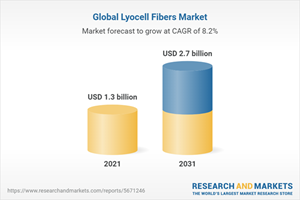Lyocell Fibers Global Market Report 2022: Wide Range of Applications from Automotive to Medicine Drives Growth

Global Lyocell Fibers Market

Dublin, Nov. 04, 2022 (GLOBE NEWSWIRE) -- The "Lyocell Fibers Market By Type, By Application: Global Opportunity Analysis and Industry Forecast, 2021-2031" report has been added to ResearchAndMarkets.com's offering.
The global lyocell fibers market was valued at $1.3 billion in 2021, and is projected to reach $2.7 billion by 2031, growing at a CAGR of 8.2% from 2022 to 2031.
Lyocell fibers are used in woven and nonwoven items such as household textiles, surgical devices, and baby diapers as they are shrink resistant, eco-friendly, biodegradable, and durable. Lyocell fibers have been shown to have enhanced antibacterial activity against different bacteria and fungus indicating promise use in medicinal or sanitary products.
The growth of the global lyocell fibers market is majorly attributed to its wide applications in various industries such as apparel, home textile, medical & hygiene, filtration, footwear, and others. Lyocell fibers is used across many applications such as apparel, home textiles, medical and hygiene, filtration and others.
Lyocell fiber is a rayon fabric made by dissolving cellulose or wood pulp in a special spinning procedure. It may be blended with linen, cotton, silk, and other fibers to make specialty goods like medical dressings as it is manufactured using non-toxic and organic solvents. It is used to make newborn diapers as well as surgical coats for doctors and nurses.
It is also used to improve the appearance of clothes in a range of textile fibers such as cotton, polyester, acrylic, wool, and silk. Lyocell fibers have been demonstrated to exhibit improved antibacterial activity against various bacteria and fungi, indicating that they might be used in therapeutic or hygienic goods.
Additionally it is used as a precursor for carbon fiber and in dehumidification sheets. Lyocell fibers are also utilized in the automobile industry for seat coverings, battery separators, and other applications. These are used in a wide range of filtration, including lightweight tea bag and coffee filter papers, industrial and automotive air and liquid filters, and food & beverage high capacity depth filters.
Further, the rise in demand from textile industry is predicted to drive the market growth during the forecast period. Lyocell fibers is used in silkier-looking things such as women's apparel and men's formal shirts. It may be combined with a wide range of different fibers, including silk, cotton, rayon, polyester, linen, nylon, and wool. Conveyor belts, specialty papers, and medical dressings are also made from lyocell fibers.
However, availability of the substitutes is projected to hinder the lyocell fibers market growth. Lyocell fibers is a semi-synthetic fabric that is commonly used as a substitute for cotton or silk. It shares many properties with other fibers such as cotton, linen, silk, ramie, hemp and viscose rayon (to which it is very closely related chemically).
On the contrary, eco-friendly production of lyocell fibers is expected to offer ample growth opportunities for the global lyocell fibers industry. Lyocell fibers is the most environment-friendly fabric. It is derived from organic and renewable sources and processed in a closed-loop system that recycles over 99.5% of the chemicals/solvents used in manufacture, with the remaining 0.5 % released as non-hazardous effluent.
The life cycle of a lyocell fibers has minimal environmental impact and is significantly more sustainable than oil-derived synthetic fibers. It requires less space, irrigation, pesticides, and fertilizers to cultivate the eucalyptus or beech trees that are used to make lyocell fibers. Lyocell fibers is made of wood, and its products dissolve in a matter of months, as opposed to other plastic-based objects, which can take up to 100 years to biodegrade.
Key Market Segments
By Type
Staple Fibers
Filament Fibers
Others
By Application
Apparel
Home Textile
Medical and Hygiene
Filtration
Footwear
Others
By Region
North America
U.S.
Canada
Mexico
Europe
Germany
France
UK
Spain
Italy
Rest Of Europe
Asia-Pacific
China
Japan
India
South Korea
Australia
Rest Of Asia-Pacific
LAMEA
Brazil
Saudi Arabia
South Africa
Rest Of LAMEA
Key Market Players
Aditya Birla Yarn
Acegreen Eco-Green Material Technology Co.Ltd
Acelon Chemicals and Fibre Corporation
Baoding Swan Fibre.Co.Ltd
Chonbang Co.Ltd
China Populas Textile Ltd
Great Duskan Corporation
Grasim Industrial Ltd
Lenzing Group
Shanghai Lyocell Fiber
Smart Fibre AG
Weiqiao Textile Company Limited
Qingdoa Textile Group Fiber
Sateri Corporation
Tamay Fiber Co Ltd
Key Topics Covered:
CHAPTER 1: INTRODUCTION
CHAPTER 2: EXECUTIVE SUMMARY
CHAPTER 3: MARKET OVERVIEW
CHAPTER 4: LYOCELL FIBERS MARKET, BY TYPE
CHAPTER 5: LYOCELL FIBERS MARKET, BY APPLICATION
CHAPTER 6: LYOCELL FIBERS MARKET, BY REGION
CHAPTER 7: COMPANY LANDSCAPE
CHAPTER 8: COMPANY PROFILES
For more information about this report visit https://www.researchandmarkets.com/r/98967m
Attachment
CONTACT: CONTACT: ResearchAndMarkets.com Laura Wood,Senior Press Manager press@researchandmarkets.com For E.S.T Office Hours Call 1-917-300-0470 For U.S./ CAN Toll Free Call 1-800-526-8630 For GMT Office Hours Call +353-1-416-8900


 Yahoo Finance
Yahoo Finance 
